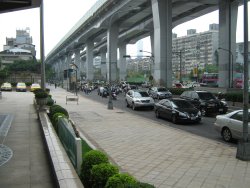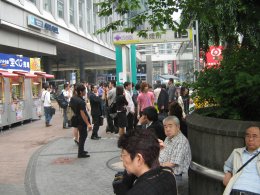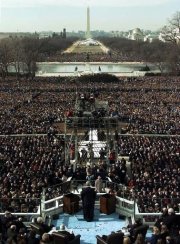Think of this as Volume 12, Number 24 of A-Clue.com, the online newsletter I've written since 1997. Enjoy.
Having just spent three weeks in China, Taiwan and Japan, I have gotten a new perspective on America's future prospects.
They are incredibly bright.
It's important to note that now, because business lobbyists and conservatives generally have launched a campaign to tell us the opposite. China and other low-wage countries are going to eat our lunch unless we tighten our belts and accept less (except, of course, for rich businessmen, who must have more "incentives" to "keep jobs here.")
It's nonsense. As serious as America's problems are, they are far less severe than those anywhere else.
And we have more weapons with which to fight those problems than anyone else does.
China

Bullshit. We have China by the balls.
The first stop on my recent journey was Chengdu, in Sichuan. It's the last stop west before you hit the Himalayas. With help (widely advertised) from people everywhere else in China, they are recovering from the earthquake.
You know what the Chengdu middle class most wants to be? American. They take American names, they love American music. While our oldsters are supposedly doing Tai Chi in the morning, their retired are ballroom dancing every evening. When they want a beer their first choice is Budweiser. For coffee it's Starbucks. A big night out is Pizza Hut. They want to drive Buicks.
China today reminds me of nothing so much as America in the early 1960s. Those who have built the present economy are a lot like our Greatest Generation in outlook. The next generation, the "Little Emperors," are spoiled like my peers were as kids. They assume economic freedom (and responsibility), and their kids assume freedom of thought as their right.
China is also like Japan 20 years ago. The one-child policy means that the population is aging, fast. Fewer productive workers to support a growing population of retired. The government won't be able to push the Little Emperors about as they did the parents, because they need the kids to have active minds, to be innovative, to help China climb the development ladder and earn more to support the elderly.
You can make a man work. You can't make him think.
China also suffers more from pollution than we do. The 1.3 billion are packed into a fraction of the land mass. Vast areas of Tibet, Inner Mongolia and Xinjiang are, and will remain, nearly empty, without the water to nurture more people. Chengdu's air is like LA's was 30 years ago, already, a choking smog smothering the city. The water's still good because they're so close to the source.
So you have demographic change, you have environmental degradation, you have a growing generation gap, and you have a political system that currently can't accommodate those demands. If we really are playing poker with China, we've got a much better hand.
Oh, and that dollar problem? It's all theirs, not ours. Say they've got $2 trillion stashed in U.S. assets right now. Devalue by half (give the Yuan an honest value) and those assets are worth just $1 trillion. China has a bigger stake in a strong dollar than we do. They say that at some point, if you borrow enough from the bank, that you own the bank? We own China.
Taiwan

I found Taiwanese more into being Chinese than the Chinese. They protect ancient Chinese traditions and culture, even while embracing the modern world. They are far ahead of China in that respect. If China could model its evolution toward any place, it would be Taiwan.
So China is taking advantage of the current recession to embrace Taiwan. Taiwan is becoming China's unofficial agent, representing its manufacturers to the West, helping them climb the development ladder and climb the value chain. In return China is buying Taiwan's goods and putting a new gloss on its own history.
While in Chengdu I saw how this plays out, in a mini-series about the Chinese revolution. Chiang kai-Shek and the Nationalists are not treated as scum in in this series. They are seen as honorable, as brave and resilient, as noble. It's as if the Confederates built a viable society in Cuba after our Civil War. Takes some of the romantic gloss off things, but it's no longer just good guys and bad guys.
Why this change of heart? Because Taiwan has freedom and democracy and capitalism, education and talent, but it is not in anarchy, the spectre of which is why Chinese tolerate what we call authoritarianism. China can answer Taiwan's short term problems, and Taiwan can answer China's long term problems.
But it will take time. More time, perhaps, than either country has.
Japan

But in terms of international competition, Japan is what's ahead of China. Best case scenario. And Japan isn't taking over anyone.
The last 20 years have humbled Japan. The 90s were an economically "lost decade" and just as the economy seemed to get back on track, this latest recession has hit hard.
One result is that Japanese have become more insular. Where once they seemed like Englishmen, now they seem more French. If this is all there is make the most of it.
One of my Japanese friends explained the problem this way. Japanese society still can't handle the risks of individualism. The nail that sticks up gets pounded down. This limits the size of the underclass (although it exists), but it dramatically limits its upside.
It's that upside risk that Japan most needs to take, but remains unwilling to take. If a kid has Asperger's or ADHD and grows up Japanese, they're not nurtured — they're isolated. Great potential also carries the risk of failure, and a society that won't risk failure won't make great successes either.
There have been Japanese entrepreneurs, great Japanese artists, great Japanese innovators in every field. Just not enough. And there's no prospect that these numbers will grow. Because Japan is getting old, fast. Some 21% in the last census were over 65, and by the next census 25% will be.
What happens most when a society ages is that it tends to look backward. Some of the most popular shows in Japan today are about history or nostalgia.
America

I was in the backyard yesterday, checking out some vegetables growing near my back fence, and I opened my ears. To my left, a crew of Meixcans were chattering in Spanish, repairing my neighbor's drainage. In front of me another crew was chattering in Czech, framing up an addition to my house.
"We're taking over," the Czech foreman laughed when I mentioned this. "But by the time you do you'll be us," I informed him, "so good luck to you."
Despite everything, America remains the most diverse nation on Earth, the most welcoming of newcomers, the most willing to accept risky behaviors and mindsets. As a result we're not aging like Japan or even China. We are still in many ways a young society, a society of risk takers.
This is why America will win the future. We have embraced freedom without falling into anarchy for over 200 years. We have fallen many times, but we have always gotten up. And we're getting up again, because my Czech home framers, as well as one of my Chengdu hosts, are all in the process of becoming Americans.
You forget how exciting the idea of America is until you're away for a while. Then you see it. The risk-taking, the adaptability, the flexibility, the tolerance of difference. It was hard won, especially over the last 40 years.
Many Americans, as nostalgic for their past as old Japanese, think we took a wrong turn in the late 1960s and things have been going downhill. That's just not true. We have been evolving, as individuals and a society, toward a more perfect union, with more room for growth and innovation than any other nation on Earth possesses.
We're what everyone wants to be, where everyone wants to be. America renews itself as no nation on Earth, and is still renewing itself.
This will be the second American century. Count on it.











You make two key points that I’m surprised so few people understand”
1) They say that at some point, if you borrow enough from the bank, that you own the bank? We own China.
2) Immigration is all that is keeping us from an aging an diminishing society like the other post-industrial nations.
Yes outsourcing production and being open to immigration can be and are subject to a lot of abuse, but they are still better than the alternatives. It’s funny how what the neo-cons are really saying behind all their Socialism bashing is that we should be more like the PRC!
You make two key points that I’m surprised so few people understand”
1) They say that at some point, if you borrow enough from the bank, that you own the bank? We own China.
2) Immigration is all that is keeping us from an aging an diminishing society like the other post-industrial nations.
Yes outsourcing production and being open to immigration can be and are subject to a lot of abuse, but they are still better than the alternatives. It’s funny how what the neo-cons are really saying behind all their Socialism bashing is that we should be more like the PRC!
Brilliant report, Dana, and I hope you’re right about our future. I honestly do. One thing I think distinguishes Americans from others around the world is our inventiveness; we’re always looking for a better, smarter, faster, easier way in everything we do. Most other cultures are focused on or around other things. Let’s hope the mimic our finer moments rather than our ugliest ones.
Diverse immigration is healthy. However, simply having an open border to one of the poorer nations like Mexico that for the past 30 years has been overwhelming us is not the answer. Mexicans bring brute labor, but rarely bring higher order talent and skill to American society. For example, you don’t see or hear about Mexican scientists, programmers, or biochemists contributing. Carpentry is great, but there are lots of channels on my dish showing that just about anyone can do it with research and the right tools.
________________
PS: I hope you ate some great food in the Chengdu region!
Jesse:
This is surprisingly common throughout American history.
Fear projects the attributes we fear onto ourselves, and causes us to move toward a society similar to what we’re fighting. Or what we think we’re fighting.
This is the real link between Joe McCarthy and Dick Cheney. Both feared our opponents. Both gave these opponents super-human attributes. Both tried to make us more like our opponents.
Both were horribly mistaken.
Even if we were technically weaker than our opponents (and we were not) the way David wins is by rejecting the game as Goliath is playing it. The New Yorker had a fine piece on that recently, using an example of girls’ basketball. The team of first-time players simply adapted a full-court press, used it constantly, and made a big noise in national tournaments.
Thanks for writing.
Dana
Jesse:
This is surprisingly common throughout American history.
Fear projects the attributes we fear onto ourselves, and causes us to move toward a society similar to what we’re fighting. Or what we think we’re fighting.
This is the real link between Joe McCarthy and Dick Cheney. Both feared our opponents. Both gave these opponents super-human attributes. Both tried to make us more like our opponents.
Both were horribly mistaken.
Even if we were technically weaker than our opponents (and we were not) the way David wins is by rejecting the game as Goliath is playing it. The New Yorker had a fine piece on that recently, using an example of girls’ basketball. The team of first-time players simply adapted a full-court press, used it constantly, and made a big noise in national tournaments.
Thanks for writing.
Dana
My friend Hiro is terribly concerned with Japan’s unwillingness to embrace the changes America has gone through over the last 40 years.
These changes have been very painful. But Hiro thinks they’re a key to our success as a nation. We embrace everyone’s capabilities, regardless of their unique disabilities or circumstance.
Even my son eventually came around, during our trip. Our Chinese hosts remarked upon how “Chinese” his attitude toward school was. (He works hard.) But over time he began defending the American system of educating everyone, despite its personal cost to him. I found that interesting.
Thanks for writing.
Dana
My friend Hiro is terribly concerned with Japan’s unwillingness to embrace the changes America has gone through over the last 40 years.
These changes have been very painful. But Hiro thinks they’re a key to our success as a nation. We embrace everyone’s capabilities, regardless of their unique disabilities or circumstance.
Even my son eventually came around, during our trip. Our Chinese hosts remarked upon how “Chinese” his attitude toward school was. (He works hard.) But over time he began defending the American system of educating everyone, despite its personal cost to him. I found that interesting.
Thanks for writing.
Dana
This is one of your finest columns, Dana. Thanks for this positive outlook on America. You took the trip but I’m able to look at my own surroundings with a new viewpoint as if I was there, too.
This is one of your finest columns, Dana. Thanks for this positive outlook on America. You took the trip but I’m able to look at my own surroundings with a new viewpoint as if I was there, too.
Paul:
What struck me most was how all my hosts felt that America has strengths their societies lack, and my realization that these are strengths gained just in the last 40 years, as a result of all the upheavals critics call “the 60s.”
It’s America’s willingness to renew itself, its flexibility, its adaptability, and its welcoming of new ideas that make it unique. This comes at a cost, one many conservatives now say they are unwilling to pay, one many Americans (perhaps most) have felt at one time or another over the last decades was too high.
But that effort has been worthwhile, and we should celebrate what has been accomplished. If you’re Czech (like the guys framing my new addition), or Mexican (like the guys working next door), or Chinese (like one host in Chengdu, who is becoming an American citizen), you can become both rich and respected here. Masayoshi Son of Softbank, by contrast is rich in Japan, but he’s not respected, because his family was Korean.
Likewise if you’re gay, or you have ADHD (as I do), you will be given an opportunity in America to use the gifts that come with your nature. The nail sticking up here is not always hammered flat.
The key to the future lies in innovation, and all Americans are eligible to be innovators. This is not true in any other society, which limits what women, gays, the mentally and physically disabled, those of mixed-race, and foreigners can do.
Part of the shock of Barack Obama was the realization in other countries that what he said many times is true, that only in America would his story even be possible. This is true for millions of other stories as well.
Dana
Paul:
What struck me most was how all my hosts felt that America has strengths their societies lack, and my realization that these are strengths gained just in the last 40 years, as a result of all the upheavals critics call “the 60s.”
It’s America’s willingness to renew itself, its flexibility, its adaptability, and its welcoming of new ideas that make it unique. This comes at a cost, one many conservatives now say they are unwilling to pay, one many Americans (perhaps most) have felt at one time or another over the last decades was too high.
But that effort has been worthwhile, and we should celebrate what has been accomplished. If you’re Czech (like the guys framing my new addition), or Mexican (like the guys working next door), or Chinese (like one host in Chengdu, who is becoming an American citizen), you can become both rich and respected here. Masayoshi Son of Softbank, by contrast is rich in Japan, but he’s not respected, because his family was Korean.
Likewise if you’re gay, or you have ADHD (as I do), you will be given an opportunity in America to use the gifts that come with your nature. The nail sticking up here is not always hammered flat.
The key to the future lies in innovation, and all Americans are eligible to be innovators. This is not true in any other society, which limits what women, gays, the mentally and physically disabled, those of mixed-race, and foreigners can do.
Part of the shock of Barack Obama was the realization in other countries that what he said many times is true, that only in America would his story even be possible. This is true for millions of other stories as well.
Dana